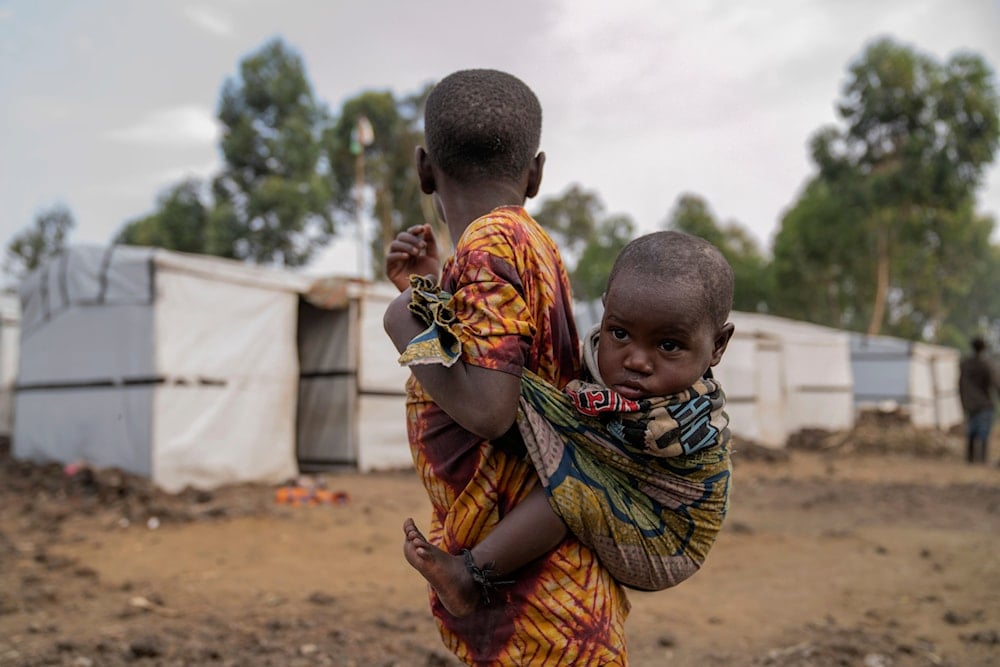Humanitarian crisis intensifies in East Congo as militants head south
The intensifying insurgency in eastern Congo has raised concerns about the potential for a wider regional conflict, with Congo’s rich mineral reserves playing a role.
-

A young girl carrying her sister on her back stands outside a refugee camp on the outskirts of Goma, Democratic Republic of the Congo, on Thursday, July 11, 2024. (AP)
The ongoing advance of Rwanda-backed M23 militants into South Kivu province in the Democratic Republic of Congo (DRC) threatens to escalate the region’s humanitarian crisis, already overwhelmed by the influx of displaced people, according to the provincial governor.
The Tutsi-led militants have continued to push south since taking control of Goma, the largest city in eastern Congo, at the end of last month. Despite efforts to mediate, the militants have gained more territory.
Prior to the capture of Goma, about 3,000 people were killed in violent clashes, and hospitals in the city were overwhelmed with casualties. Humanitarian aid was severely impacted, with non-essential workers evacuated and warehouses looted.
Jean-Jacques Purusi Sadiki, the governor of South Kivu, told Reuters, "There has since been an influx of people fleeing Goma into South Kivu, creating huge humanitarian needs that we are trying to face." He added that the region was already struggling with a lack of resources, and traffic between South and North Kivu was halted, leading to shortages.
"Our fear is that should M23 advance to this side, it will assist in a natural humanitarian catastrophe," he said, speaking from South Kivu’s capital, Bukavu.
Driving the news
The intensifying insurgency in eastern Congo has raised concerns about the potential for a wider regional conflict, with Congo’s rich mineral reserves playing a role.
As the world’s leading producer of tantalum and cobalt, essential for electric vehicle and mobile phone batteries, Congo also holds large deposits of copper, coltan, lithium, tin, tungsten, and gold.
Despite its vast resources, Congo remains heavily reliant on foreign aid, with 70% of humanitarian operations funded by the US last year. However, the situation has been worsened by a pause in US foreign aid imposed by President Donald Trump last month.
Bruno Lemarquis, the top UN aid official in Congo, explained that many partners have been forced to pause their projects. "Finding alternatives will be extremely challenging," he stated.
The situation has further complicated efforts to deliver aid due to the closure of Goma’s airport, making it harder to evacuate injured individuals and bring in supplies. Lemarquis added, "Now that the situation has stabilized and security in the city has improved, we need to bring back staff, which isn’t something that can happen overnight."
The M23's ongoing offensive is the latest chapter in a long history of Tutsi-led insurgency in Congo’s east, following a series of conflicts between 1996 and 2003 that involved neighboring countries and led to millions of deaths.
Rwanda has been accused by Congo, the UN, and several Western nations of backing the M23 militants with troops and weapons, but it denies the allegations, asserting it is acting in "self-defense". A ceasefire declared by the militants in early February for humanitarian purposes quickly collapsed.
The Congolese government reported that its troops had been attacked multiple times since a joint summit last week between Eastern and Southern African blocs aimed at resolving the crisis.

 3 Min Read
3 Min Read










